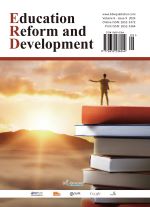Abstract
50 EFL teachers, 100 students, and 12 administrative leaders from 10 universities in Southern China are selected as subjects to explore the structural features of EFL teachers’ competence in curriculum-based moral education. Questionnaires, interviews, and classroom observations are conducted to gather their insights and feedback on how to integrate moral education into English language teaching (ELT). The data is analyzed using both qualitative and quantitative multi-factor analysis. A novel competency model is proposed with four layers: teaching design, situational construction, classroom interaction, and multiple assessment. Recommendations are provided to enhance foreign language teachers’ awareness of moral education and the quality of curriculum-based moral education.
References
McClelland DC, 1998, Identifying Competencies with Behavioral Event Interview. Psychological Science, 1998(9): 320–331.
Dineke EH, et al., 2004, The Development and Validation of a Framework for Teaching Competencies in Higher Education. Higher Education, 48(3): 253–268.
De Pro Chereguini C, Ponce Gea AI, 2021, Model for the Evaluation of Teaching Competences in Teaching–Learning Situations. Societies, 2021(11): 56.
Zhou Y, 2022, In-Depth Teaching Design of Integrating Moral Education into College Foreign Language Teaching. Open Access Library Journal, 9(10): 1–10.
Tursunova IM, Khaitbaeva NK, 2021, Spiritual and Moral Education of the Young Generation in Teaching Russian as a Foreign Language (Teaching-to Educate). ACADEMICIA: An International Multidisciplinary Research Journal, 11(10): 1762–1765.
Tantawy N, 2020, Questioning the Policy of Teaching ‘Moral Education’ Through English as a Foreign Language in a Private School in Dubai. Language Teaching Research Quarterly, 2020(16): 71–88.
Mynbayeva A, Karabutova, 2023, The Axiological Competence of Teachers and Moral Education in Kazakhstan. International Journal of Psychology, 2023(58): 416–417.
Nunez-Flores M, Lorent VJ, 2022, Inclusive Education and Its Relationship with the Social, Emotional and Moral Competencies of School Teachers. Aula Abierta, 51(2): 171–180.
Yuan X, 2022, Research on the Capacity Building of College English Teachers’ Ideological and Political Teaching in Curriculum. College English, 2022(33): 108–110.
Tai MK, Omar AK, 2023, Leading Teaching and Learning in the Era of Education 4.0: The Development of Teacher Competency Model via Structural Equation Modelling. International Journal of Management in Education, 17(2): 130–156.
Chu L, Wang X, 2020, A Study on the Construction of College Foreign Language Teachers’ Curriculum Ideological and Political Teaching Ability in the New Era. Journal of Huzhou Normal University, 2020(12): 26–30.
Gao Y, Zhang Z, 2022, A Structural Model of College English Teachers’ Curriculum Ideological and Political Teaching Ability. Foreign Language Audio-Visual Teaching, 2022(1): 8–14.
Zhao G, Sun W, Zhong J, 2020, Research on the Construction of College Teachers’ Competency Model from the Perspective of "Curriculum Thought and Politics." Nanjing Social Sciences, 2020(7): 136–143.
He Q, Zhao Z, 2018, Investigation and Reflection on Teaching Competence of University Teachers. Chinese University Teaching and Learning, 2018(7): 77–85.
Sun Y, Zhang H, Zhang L, 2018, Competence Framework for Foreign Language Teachers from the Perspective of National Standards. Chinese Foreign Language, 2018(2): 4–11.
